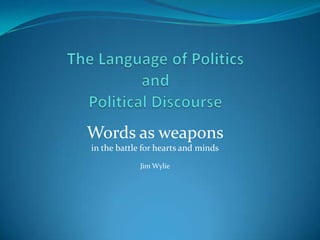Signaler
Partager

Recommandé
Recommandé
To what extent is Hollywood influenced by the Pentagon and to what ends (Auto...

To what extent is Hollywood influenced by the Pentagon and to what ends (Auto...Michael Exton BA (Hons), MSc
Contenu connexe
Tendances
To what extent is Hollywood influenced by the Pentagon and to what ends (Auto...

To what extent is Hollywood influenced by the Pentagon and to what ends (Auto...Michael Exton BA (Hons), MSc
Tendances (20)
The U.S. Military Industrial Complex: A Diagrammatic Representation

The U.S. Military Industrial Complex: A Diagrammatic Representation
The CIA in Indonesia and the Secret War in Laos-Book Reviews

The CIA in Indonesia and the Secret War in Laos-Book Reviews
Us intelligence officer 'every single terrorist attack in us was a false fla...

Us intelligence officer 'every single terrorist attack in us was a false fla...
Us intelligence officer 'every single terrorist attack in us was a false fla...

Us intelligence officer 'every single terrorist attack in us was a false fla...
To what extent is Hollywood influenced by the Pentagon and to what ends (Auto...

To what extent is Hollywood influenced by the Pentagon and to what ends (Auto...
Democratic Great Power Support for Contested Autocracy: Understanding the U.S...

Democratic Great Power Support for Contested Autocracy: Understanding the U.S...
Why us military system favours sycophancy and apple polishing

Why us military system favours sycophancy and apple polishing
En vedette
En vedette (11)
Religion, Kognition og Kannibalisme blandt indianere i Sydamerika

Religion, Kognition og Kannibalisme blandt indianere i Sydamerika
Discourse and Genre (the relationship between discourse and genre) 

Discourse and Genre (the relationship between discourse and genre)
Critical discourse analysis of the ideology of media presented through news

Critical discourse analysis of the ideology of media presented through news
Similaire à Assignment 3
Similaire à Assignment 3 (6)
IOSR Journal of Applied Physics (IOSR-JAP) e-ISSN 2278-48.docx

IOSR Journal of Applied Physics (IOSR-JAP) e-ISSN 2278-48.docx
Assignment 3
- 1. The Language of Politics and Political Discourse Words as weapons in the battle for hearts and minds Jim Wylie
- 2. An analysis of the language of political speechusing - an excerpt from an address to the nation by former United States President George W. Bush delivered at Ft. Bragg, NC, home of the U.S. airborne and special operations forces on 28 June 2005. Sourced from: http://uspolitics.about.com/od/ speeches/a/speech_28jun05.htm
- 3. The aim of this analysis: To identify and examine the functions and purposes of the linguistic mechanisms employed in this speech excerpt in the light of topics discussed in Unit Seven of the Study Guide for Language Discourse and Power (Massey University 2009).
- 4. The Speech – an overview In this nationally televised speech the acting U.S. President George W. Bush, whose own approval rating was then at an all-time low, was seeking to shore up flagging support for the war in Iraq. The short excerpt chosen for analysis came near the end of the President’s speech during which he had already outlined most of his intended military and political objectives in the Middle East and was attempting to justify those measures. This excerpt was chosen because it succinctly sums up some of his main arguments in defence of continuing the war and contains many prime examples of the mechanisms typically employed in political speeches.
- 6. Since the original reason given for the invasion (WMDs) had been found to be baseless Mr. Bush was now trying to justify the continuing U.S. military presence in Iraq as necessary for self-defence and freedom. He did not explain how remaining in Iraq would achieve these goals.
- 8. What was ‘vital’ about the region is open to interpretation but the word conveys a sense of urgency and coercive force.
- 10. What the President said (part 4) “They wear no uniform; they respect no laws of warfare or morality. They take innocent lives to create chaos for the cameras.” One again the tool of dissimulation is being employed as a means to legitimise the continuation of the American military presence. The message is that ‘they’ are not like ‘us’. ‘They’ (unlike us) do not respect (our) laws of warfare or even (our) ‘laws’ of morality. ‘They’ have no respect for human life because ‘they’ (allegedly) deliberately kill innocent people just to try and manipulate the media in ways that will help their cause. ‘They’, in other words, are inhuman. If we accept Mr. Bush’s claims then that would seem to legitimise the imposition of control by the supposedly morally superior American nation.
- 11. What the President said (part 5) “They are trying to shake our will in Iraq, just as they tried to shake our will on September 11, 2001. They will fail.” Once again the ‘we’ group was portrayed as being threatened by the ‘them’ group. The fact that the ‘them’ group that the American troops were fighting in Iraq were almost certainly not in any way connected with the ‘them’ group who carried out the September 11 attacks was conveniently ignored. By conflating the Iraqi resistance and the 9/11 bombers into the one ‘them’ group the President was invoking a very powerful emotional symbol of national outrage and using it to delegitimise the Iraqis’ cause in order to legitimise his own. By saying ‘they’ will fail he meant that the ‘we’ group (the American nation) would triumph and he was thereby appealing to patriotic sympathy, another powerful coercive force.
- 14. References Study Guide. (2009). Study Guide for Language, Discourse and Power. Massey University, School of Language Studies. van Dijk, T. A. (1998). Opinions and ideologies in the press. In A. Bell & P. Garrett (Eds.) Approaches to Media Discourse, (pp. 21-63). Oxford: Blackwell. Fairclough, N. and Wodak, R. (1997). Critical discourse analysis. In T. A. van Dijk (Ed.) Discourse as social interaction. London: Sage. Chilton P., & Shaffner, C. (1997). Discourse and Politics. In T. A. van Dijk (Ed.) Discourse as social interaction. London: Sage.
